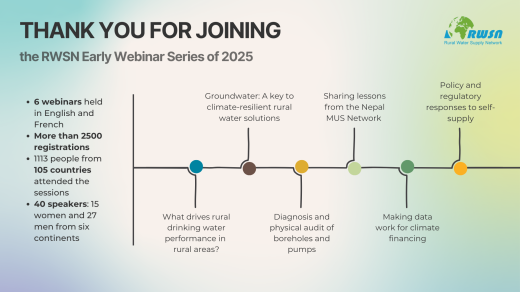Highlights of RWSN's projects, partnerships and knowledge products
RWSN Early Webinar Series 2025 Join us for six webinars running between April and June
 Thank you for joining the RWSN Early Webinar Series 2025
© RWSN • RWSN
Thank you for joining the RWSN Early Webinar Series 2025
© RWSN • RWSN
Project starts: 2025
Project finished: 2025
Summary
We are excited to announce the first RWSN webinar series of 2025, running from April to June! Each session will feature real-world experiences, lessons learned, and opportunities to engage with peers from around the world. Whether you are a practitioner, policymaker, researcher, or student, there is something for everyone.
***French interpretation is provided for each webinar.***
Project Description
What drives rural drinking water performance in rural areas? | RWSN Sustainable Services Theme
29 April, 13:00 CEST (Geneva) / 14:00 EAT (Nairobi) / 07:00 EDT (New York) / 16:30 IST (New Delhi)
It is not fully understood what drives good performance in rural areas, with policy decisions in the sector mostly based on what has failed rather than what has worked. Is it the model, the funding, or the enabling environment? In this webinar, we will share insights from research conducted in Ghana that explored this very question, as well as interesting experiences from four countries that apply different service delivery models.
Groundwater: A Key to Climate-Resilient Water Solutions for Rural Communities | RWSN Sustainable Groundwater Development Theme
6 May, 14:00 CEST (Geneva) / 15:00 EAT (Nairobi) / 08:00 EDT (New York) / 17:30 IST (New Delhi)
Groundwater holds significant potential as a climate-resilient solution for rural communities facing water insecurity due to climate change. However, without careful planning and consideration, reliance on groundwater may also present risks that are exacerbated by climate variability and water mismanagement. This webinar will explore both the opportunities and challenges of using groundwater as a sustainable water supply in the context of climate change. Additionally, we will discuss adaptation strategies and mitigation practices that the WASH sector can implement to ensure resilient and equitable water access for rural populations.
Diagnosis and physical audit of boreholes and pumps: striving for accountability | Stop The Rot initiative
20 May, 14:00 CEST (Geneva) / 15:00 EAT (Nairobi) / 08:00 EDT (New York) / 17:30 IST (New Delhi)
A systematic process for diagnosing why boreholes and pumps fail or operate poorly can significantly improve rural water supply projects. Besides technical diagnostics, the insights gained through such a process could be used to drive greater accountability by, ultimately, prompting corrective action when contractors, NGOs, governments or funders repeatedly fail to meet required construction quality standards. This webinar showcases BASEflow's eight years of diagnostic work in Malawi, and examines the presence (and absence) of accountability measures in the rural water sector.
Sharing lessons from the Nepal MUS Network | RWSN Multiple-Use Water Services Theme
10 June, 14:00 CEST (Geneva) / 15:00 EAT (Nairobi) / 08:00 EDT (New York) / 17:30 NPT (Kathmandu)
Making Data Work for Climate Financing | RWSN Data for Action Theme
17 June, 14:00 CEST (Geneva) / 15:00 EAT (Nairobi) / 08:00 EDT (New York) / 17:30 IST (New Delhi)
In this webinar, we will explore how leveraging WASH data can be a powerful tool for unlocking climate financing mechanisms such as carbon credits, helping to diversify funding streams for rural WASH programs. Climate finance offers a critical opportunity to enhance the resilience and sustainability of WASH services, but accessing these funds requires more than just identifying opportunities—it demands robust evidence, clear linkages to climate impacts, and strategic insights.
Policy and regulatory responses to self-supply | RWSN Self-Supply Theme
24 June, 09:00 CEST (Geneva) / 10:00 EAT (Nairobi) / 12:30 IST (New Delhi) / 18:00 AEDT (Sydney)
This webinar will explore how different countries are addressing self-supply of water services through policy and regulation. Featuring 3-4 case studies from different continents, the session will highlight diverse approaches across high-, middle-, and low-income contexts. Following the presentations, an open discussion will provide space for cross-learning and insights into effective policy and regulatory responses for self-supply.
 Google Übersetzer
Google Übersetzer
